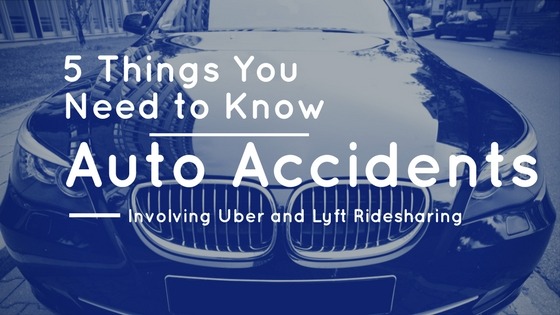Ridesharing services like Uber and Lyft are quickly becoming commonplace in today’s society. These services offer economy and efficiency in the world of transportation. Yet, they carry the same risks and dangers associated with any form of transportation. The last thing any rideshare user thinks about is a car accident. Perhaps, they should start doing so! Here, we will look at five things you should know about accidents involving Lyft and Uber.

-
Uber and Lyft Have Insurance Coverage
Both of the major companies provide insurance for rideshare vehicles. This is a supplemental policy that supports the driver’s own insurance. When it comes to Uber, this protection only works while the driver’s app is active. Drivers for both companies have a small amount of coverage while waiting for a rider. Once a passenger is picked up the coverage transforms into a higher level of protection. The amount of coverage for Uber is $1 million of excess liability coverage per accident. Lyftalso provides a $1 million policy from match to drop off.
Uber and Lyft also provide uninsured/underinsured motorist bodily injury coverage. The amount of this coverage is also $1 million, and is effective only for the duration of the trip.
A million dollar policy may seem like a lot, but medical expenses in serious auto accidents can exceed this amount. What happens in this situation is a little more tricky. A passenger will have to make a claim against the driver’s personal policy and hope that enough coverage exists. In some cases, passengers may be able to sue the company.
-
Gaps in Collision Coverage
Drivers are required to have their own policy to cover their own property loss. Ridesharing policies do not cover the collision expenses associated with the driver’s car. Both parties do offer contingent collision coverage, but the amount may not be sufficient. Lyft has a $50,000 contingent collision and comprehensive policy when carrying a passenger. Uber has a contingent policy up to cash value with a $1,000 deductible. While drivers are offline (i.e. driving to a popular pick-up area) there is no collision coverage provided by either company. The same goes for times when a driver is waiting for a fare. Neither company covers the driver’s car for collision expenses.
-
Rideshare Drivers Possibly Under-insured!
A recent survey seriously questions whether drivers are sufficiently insured. The study by the app company Sherpashare found that 77% of drivers operate without ridesharing insurance. This becomes problematic due to the next point in our list.
-
Driver Policies May be Invalidated
Most personal polices aren’t designed to cover vehicles acting in a commercial capacity. In fact, charging someone a fee for transportation is strictly forbidden by most policies. When a company gets wind that a driver is working for Uber or Lyft the company may invalidate the policy. This could leave the driver without any personal insurance at all! Although ridesharing policiesare becoming more popular many drivers still operate without them. Whether you are a driver or a rider being in a rideshare vehicle without the right insurance could leave you empty-handed.
-
Companies May Deny Liability
Uber’s terms of service state that it reserves the right to deny liability. A user of Uber also consents to arbitration as detailed in the terms of service. This means that drivers and riders could be subject to a lengthier legal process if an accident occurs. Legal issues affecting car accident lawsuits are also highly dependent on state law. Thus, it is recommended to get the help of an attorney if you feel you have a cause of action as a driver or passenger.
If you have been involved in an accident while participating in a rideshare it is important to get legal help right away. Call our law offices today at any of our convenient locations and get a free consultation.
Arlington (817) 522-4451
Denton (940) 222-4060
Dallas (972) 362-6848
Fort Worth (817) 764-1375
Cedar Hill (972) 338-9427
McKinney (469) 522-3688
Lewisville (972) 354-4605
You can also contact us online by using our quick contact form.










